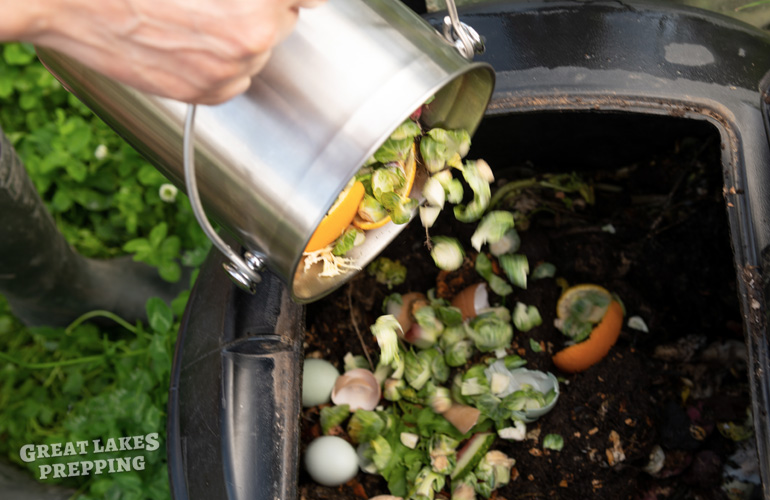What You Should, Could, and Should NEVER Compost

If you’re interested in organic gardening, composting is something you will be doing a lot of. But the good news is that it couldn’t be easier. Put stuff in a container and then leave it alone! And you don’t need expensive compost tumblers to do it. You can quickly make your own 5 gallon bucket compost bins, and have portable composters that can be easily moved and emptied when needed.
So let’s talk about the sort of materials to put in your composter. Actually, let’s talk about the kinds of things you should compost, the kinds of things you could compost, and the kinds of things you should never compost.
What You Should Definitely Compost
These are the best kinds of things you can throw into your composter. They will contribute to the most beautiful, nutrient-rich compost for your garden.
- Vegetable and Fruit Scraps and Trimmings
- Peels (carrots, potatoes, onions, apples, bananas, etc)
- Stems (peppers, tomatoes, etc)
- Ends (onions, celery, etc)
- Any part of a fruit or vegetable you would ordinarily discard
- Rotted, Brown, or Expired Fruits and Vegetables
- Egg Shells (crushed)
- Coffee Grounds (including filter, if paper)
- Tea Bags (if organic, with staple removed)
- Herbivore Manure
- Rabbit
- Hamster
- Guinea Pig
- Sheep
- Goat
- Cow
- Horse
- Chicken (in moderation, due to high urea content)
- Garden Waste (end of year vegetable plants)
- Corn stalks and husks
- Beanstalks
- Cucumber vines
- Potato leaves
- Any dead/dying vegetable plants (excluding tomato and pepper plants)
- Wood Ash
- Fireplace ash
- Bonfire ash
- Any ash from a wood fire (not ash from coal or charcoal)
What You Can Compost, but Isn’t Really Helping
There are lots of items that can be tossed in your composter, but they aren’t necessarily contributing to an awesome compost. I tend to avoid adding a lot of things from this category to my compost; maybe just a handful here and there.
- Grains and Grain Products
- Bread
- Cereal
- Pasta
- Rice
- Potato chips
- Crackers
- Nuts and nut shells
- Yard Waste
- Grass trimmings
- Dead leaves
- Weeds
- Paper Products
- Shredded paper
- Shredded cardboard
- Paper towels
Stuff You Should Never Put in Your Composter
Not only will these things not help create a rich compost, they will actively harm your compost and put your entire garden at risk. Additionally, many of these items can lead to maggots, rats, other pests, and a terrible stink!
- Meat Products
- Meat
- Bones
- Animal trimmings
- Lard
- Grease
- Dairy Products
- Milk
- Cheese
- Butter
- Plant-Based Fats
- Cooking oil
- Shortening
- Salad dressing
- Mayonnaise
A Couple More Things…
- It’s best to avoid composting a bunch of seeds, unless they have been cooked or ground. Tossing seeds into your composter is basically just planting those seeds in the most luxurious and inviting soil! So, to avoid having a bunch of sunflowers or peppers sprouting in your compost containers, do your best not to throw a bunch of seeds in there.
- Similar is true for potatoes. Throwing a full, raw potato into the compost would not hurt anything, but it’s practically the perfect environment for that potato to sprout. If composting whole potatoes, it’s best to cook them or chop them up first to avoid sprouting.
- It’s OK to compost corn cobs, but they are quite dense and can take a long time to fully break down. Therefore it’s advised to grind them in a food processor or cut into small chunks before adding to the compost bin.

